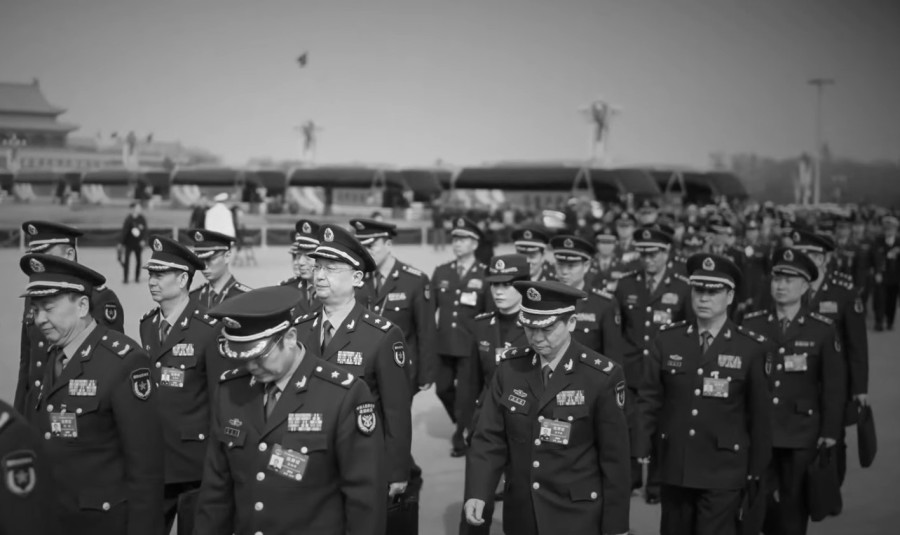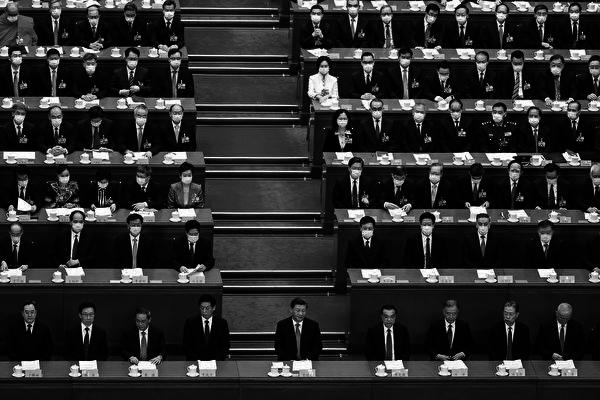The new prophecy mentions that Xi will face a rebellion from the military and local warlords. The image shows the representatives of the Chinese military attending the Two Sessions in Beijing. (Video screenshot)
[People News] On May 19, Cai Shenkun, a commentator based in the United States and an independent columnist, shared on the social media platform X that insider information from Beijing indicates that General He Hongjun, the executive deputy director of the Political Work Department of the Central Military Commission, took his own life while in custody. He was rushed to the 301 Hospital for emergency treatment, but unfortunately could not be saved and was pronounced dead on the afternoon of May 18.
This news has garnered significant attention from the public. In my attempt to verify the information, I searched for 'General He Hongjun suicide' on Google, which returned approximately 1,940 results from various online media outlets, including the 'Liberty Times' and 'Wuyou Information'.
General He Hongjun first came into the public eye following the downfall of Miao Hua, as he was responsible for the daily operations of the Political Work Department. This department plays a crucial role in guiding the ideological and cultural propaganda work of the People's Liberation Army, as well as overseeing organisational development, including the evaluation of senior generals, highlighting its considerable influence. There is public concern regarding whether he might be implicated in the Miao Hua case.
Public records indicate that the 64-year-old He Hongjun previously held the position of deputy director of the Cadre Department of the General Political Department of the Communist Army and served as the director of the Bureau for Retired Cadres. In 2017, he was appointed as the assistant director of the Political Work Department of the Central Military Commission, and on February 24, 2018, he was elected as a representative of the 13th National People's Congress.
In April 2019, He Hongjun was promoted to Deputy Director of the Political Work Department of the Central Military Commission. By July 2024, he was officially designated as the Executive Deputy Director of the Political Work Department of the Central Military Commission, a role equivalent to that of a theatre commander. His military rank advancements were entirely orchestrated by Xi Jinping, with promotions to Major General in 2013 and Lieutenant General in 2019 occurring during times when Xi had consolidated or was still exercising military power. Notably, on July 9 of last year, Xi Jinping personally conferred the rank of General upon He Hongjun at the Bayi Building, leading many to view him as a core member of Xi's military faction, even more closely aligned than Miao Hua and He Weidong.
Zhao Lanjian, a former Chinese media figure who first reported the arrest of He Weidong, the Vice Chairman of the Central Military Commission, revealed on April 24 this year via the X platform that He Hongjun was taken away on April 20.
There has been growing public concern regarding He Hongjun's unusual absence and strange appearances. On April 23, a national model city (county) naming conference for dual support was held in Beijing. Traditionally, He Hongjun, as the Executive Deputy Director of the Political Work Department of the Military Commission, would have attended and read the commendations, but he was notably absent. On January 22 of this year, He Hongjun participated in the 2025 Capital Military and Political Symposium in Beijing, yet state media did not mention his name, and footage from CCTV showed that his nameplate was obscured, rendering his name unreadable. This peculiar situation has drawn significant public interest.
Frequent disclosures by Cai Shenkun and Zhao Lanjian about the fall or suicide of officials involved in the internal power struggles of the Chinese Communist Party (CCP) have been confirmed by the Party itself. This includes the arrest of Miao Hua, the suicide of Yu Jianhua, head of the General Administration of Customs, the investigation of Lan Tianli, and the disappearance of He Weidong, who has been missing for over two months without any news. Consequently, many people prefer to interpret their revelations as prophecies.
Cai Shenkun remarked that yet another senior general born in the 1960s has succumbed to the brutal political infighting within the military. Just last year, he was in a position of great prominence, and now, no one could have anticipated such a tragic outcome. This inevitably recalls the case of Zhang Yang, the former director of the General Political Department, who took his own life at home on November 23, 2017. Following Zhang Yang's death, he was criticised by the CCP's military newspaper for 'evading punishment from the Party and the law, and his actions were deemed extremely vile.'
This illustrates how the Party can be 'as cruel and ruthless as a cold winter' towards those who have been disloyal. The issue lies in the fact that the standards of loyalty and disloyalty within the Party are often inconsistent. Regarding corruption, from top to bottom, how many are truly untainted? The ongoing downfall of senior generals has left the morale within the People's Liberation Army (PLA) in disarray. According to Hong Kong's Sing Tao Daily, since the 20th National Congress of the CCP, Xi Jinping has initiated an anti-corruption campaign targeting the military. Among the six leaders of the Military Commission, excluding the commander-in-chief, three have already been ousted. In light of the harsh realities of military infighting, the generals are filled with grievances, and the downfall of one could implicate many others.
At present, the key meeting regarding personnel arrangements within the Chinese Communist Party (CCP) and the Fourth Plenary Session is likely entering a phase of intense agenda planning. In this context, the death of He Hongjun has become a highly sensitive issue. Cai Shenkun asserts that He Hongjun's untimely demise will have a devastating impact on the future stability of the People's Liberation Army (PLA) and the military's image. 'If accountability is to be assigned, it will undoubtedly fall on Xi Jinping. Xi Jinping cannot shoulder such responsibility, so we will see what kind of outcome the upcoming Fourth Plenary Session will yield.'
Regardless of whether He Hongjun is alive or deceased, and which faction is behind the rumours, this situation underscores the violent internal strife within the CCP. There is nothing they cannot accomplish, only what people cannot foresee. For a party leader whose power is unstable, maintaining the party in such an environment can lead to sudden upheavals, making anything possible.










News magazine bootstrap themes!
I like this themes, fast loading and look profesional
Thank you Carlos!
You're welcome!
Please support me with give positive rating!
Yes Sure!